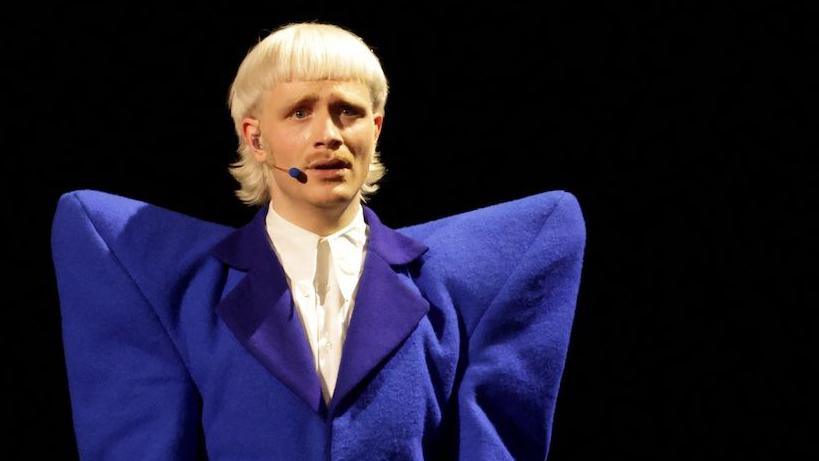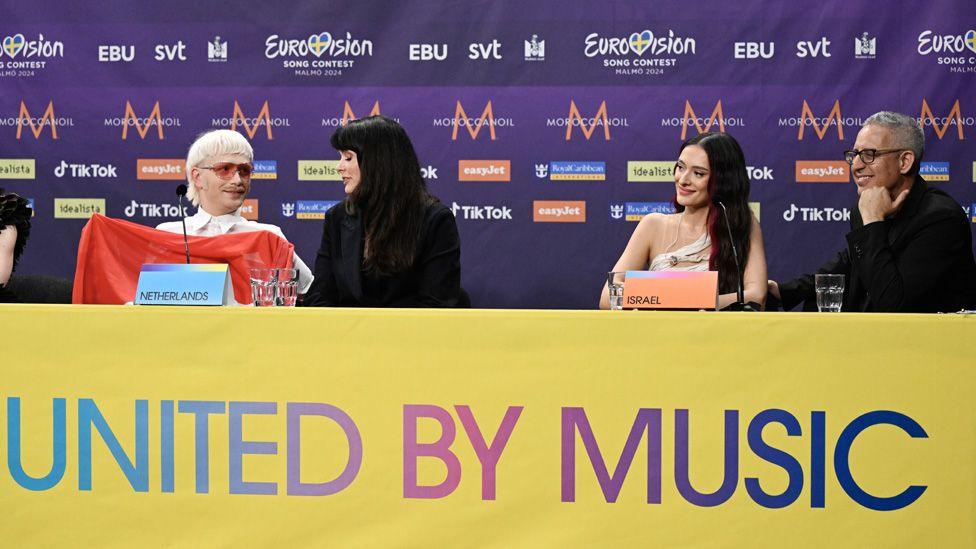Confusion over fate of Dutch Eurovision star

Joost Klein is due to represent the Netherlands in Saturday's Eurovision final
- Published
The Dutch Eurovision contestant will not perform in Friday evening's dress rehearsal while organisers investigate a backstage incident.
The European Broadcasting Union (EBU), which organises the event, has not specified what the "incident" involving Joost Klein was.
The evening dress rehearsal is watched by juries around Europe to determine their scores for the grand final.
Instead, jurors will be shown a taped performance from earlier in the week.
Klein's song Europapa is considered one of the front-runners at this year's contest.
It is dedicated to his parents, who died when he was a child. The performer had promised them that he would one day compete at Eurovision.
His suspension became clear on Friday afternoon, during the first dress rehearsal for Saturday's televised grand final.
Klein's props were being set up on stage inside the Malmö Arena when a production manager indicated they should be removed.
His song was then skipped without explanation, and Israel’s entrant Eden Golan, who was next in the running order, took his place.
The EBU later issued a statement saying they were "investigating an incident that was reported to us involving the Dutch artist".
The statement was updated shortly after 20:30 CET (19:30 BST), half an hour before the jury rehearsal began.
"The investigation into the incident with the Dutch artist in this year’s Eurovision Song Contest is still ongoing," it said.
"Discussions are also taking place between the EBU and AVROTROS, the Dutch participating broadcaster.
"While the investigation continues the EBU has decided that Joost Klein will not perform during Dress Rehearsal 2 of the competition which is voted on by juries in the 37 participating countries.
"His performance from Semi Final 2 will be used instead."
"We have no further comment at this time and will update in due course."
Eurovision 2024: Seven contentious moments from Europe’s fabulous singing show
- Published10 May 2024
When is the Eurovision final and who is competing?
- Published10 May 2024

Joost Klein (left) and Eden Golan (second right) appeared together at a press conference on Thursday
Initial speculation suggested that Klein's suspension had been the result of an alleged altercation with Israel's delegation.
The country's participation in Eurovision has been a source of controversy amid rising civilian deaths and a worsening humanitarian situation in Gaza, and there have been protests in the Swedish host city.
At a Eurovision press conference on Thursday, Golan was asked whether she had "ever thought that by being here you bring risk and danger for other participants and public?"
When the Israeli singer was told by the moderator that she did not have to answer the question, Klein chimed in: "Why not?"
Golan replied: "I think we're all here for one reason, and one reason only, and the EBU is taking all safety precautions to make this a safe and united place for everyone, and so I think it's safe for everyone and we wouldn't be here [if not]."
Earlier, when Klein was asked if his song could live up to the Eurovision slogan and unite people by music, he replied: "I think that's a good question for the EBU."